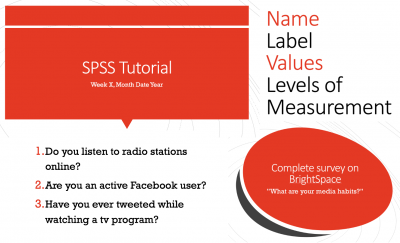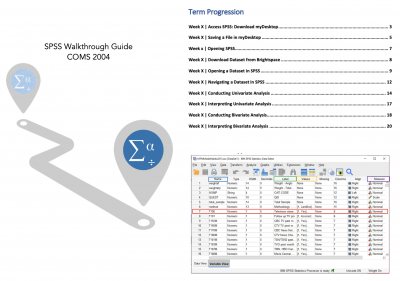This summer, Emily Hiltz, an instructor in the School of Journalism and Communication, teamed up with third-year student Roop Bajwa through the Students as Partners Program (SaPP) with the goal of bridging the gap between two core courses in Communication and Media Studies. Recognizing the need for more hands-on training using the software SPSS, Hiltz and Bajwa launched a project called “Bridging Student Experiences Using Quantitative Tools Across COMS Methods Courses” to better prepare students as they progress through the program. The following interview shares their reflections on the project.
R.B.: I’m curious to know what drew you to the Students as Partners Program?
E.H.: I wanted to adjust the quantitative learning modules in Introduction to Communication (COMS 2004) so that students would have some more hands-on training using a statistical analysis software called SPSS. Another compulsory course in our program, Quantitative Research in Communication (COMS 3001) involves SPSS analysis. With your training in both courses, you were an excellent fit for this project!
E.H.: And what was your motivation in completing the SaPP?
R.B: I think first and foremost, I was very eager to work with you in some capacity. But after hearing your idea to improve the content in your second-year research course to meet the gap to the third-year quantitative research course, I was immediately hooked. After having just taken COMS 2004 in the fall and COMS 3001 in the winter, I knew that I had a recent and fresh experience on what is missing from preparing students. SaPP really allowed both of us to hone in on our experience and knowledge with both courses to create something great.

Figure 1: Images of the SPSS Tutorial Slidedeck created by Roop Bajwa, 2021.
E.H.: The ‘bridge’ is an apt metaphor for this work. Could you briefly explain your role in the project?
R.B: My role in the project involved auditing both courses for their content, their methods of delivery, sequencing of content, and what resources each course provided. This audit enabled me to see what existed in both courses, and then analyze what foundational teachings students would benefit from in COMS 2004 before progressing to COMS 3001. From there, a lot of my work involved providing recommendations for changes or additions to the lecture content, tutorials, micro assessments etc.
E.H.: The audit of my course was incredibly helpful. I have been referring to your notes and suggestions while prepping for the start of this upcoming term. Let’s talk some more about the deliverables you produced through this experience. What did you develop for me to use in COMS 2004 this fall?
R.B: Beyond the research-based documents, like the audit and general course recommendations, the first major deliverable was a ‘Walkthrough Guide’ on SPSS, the statistical software. It was inspired by course resources in COMS 3001. The guide walks students through foundational parts of SPSS step-by-step with notes, screenshots, annotations and tips. Since this guide will be used by students to learn SPSS, I also created a mini assessment called an ‘SPSS Checkpoint’ to encourage students to download and open a file in SPSS. The final major deliverable I produced was a tutorial guide and slidedeck designed to introduce quantitative analysis in SPSS in an interactive way.
E.H.: Everything has been so positive, which is great, but could you share if you encountered any challenges in this process?
R.B: One thing I struggled with in the beginning was transitioning from being the student to a student partner where I was challenged to think critically about each course to pinpoint areas of improvement. It felt unnatural to analyze a class for its content, and even more to tell you as the instructor how you may change things. Fortunately, I soon realized my purpose as a student partner is to leverage my perspective and experience for the benefit of future students. From there, I became more confident in making recommendations.
E.H.: There is definitely always room for improvement and learning when teaching courses, that’s how I approach it! On the flip side, what have you learned from this experience? Could you speak to any key skills you’ve gained?
R.B: I feel as though I’ve learned and grown a lot through this experience. One key skill I’ve improved upon is my ability to efficiently convey my ideas and thoughts. While we stayed connected through email, our bi-weekly meetings were the main venue for me to take the research and brainstorming I’ve done and succinctly present a summary of my findings to you. This taught me how to present information effectively, but to also recognize what magnitude of information is necessary to understand without going overboard.

Figure 2: Collage of screenshots from the SPSS Walkthrough Guide by Roop Bajwa, 2021.
E.H.: Is there anything you would like to say to other students potentially interested in becoming a Student as Partner?
R.B: I would say that this program puts you in a position to thrive off your experience as a student, while pushing you to think in ways unexplored academically. If you approach SaPP with an open mind, your partnership with a faculty member is an incredibly hands-on way to learn about how a course is designed and delivered. Whether it’s SaPP, or another experiential learning program, taking part in something like this is so rewarding because your work will make a tangible impact in the Carleton community.
R.B: As the faculty member in this partnership, is there anything you found unique or enlightening about the SaPP experience?
E.H.: Having your insight into your experience of both courses was very beneficial. It allowed me to see where existing content in my course can be strengthened to serve as a stronger quantitative ‘bridge’ for students’ future course work in COMS. You also provided some exciting suggestions for signposting content throughout the course so that key concepts are woven across the course more seamlessly. I think we also trust each other a great deal and kept the dialogue going as the project unfolded. All great things.
E.H.: Do you think this experience has impacted your career goals?
R.B.: Without a doubt. Right now, career goals for me are all about experiencing and gaining new skills. Before the SaPP, I’ve only ever been a student in academic environments. I was never a tutor or TA. So, this program gave me a new interest in designing content to help others learn and be successful. My positive experience as a student partner indicates to me that if an opportunity or position arose in teaching innovation, I would likely enjoy it and succeed.
E.H.: I’m so glad you’re interested in learning more about teaching! Thanks for sharing your great ideas and for your hard work throughout the summer. It’ll be great to integrate the content you worked on into my course.
The Students as Partners Program (SaPP) offers faculty, instructors, contract instructors and learning support staff the opportunity to provide a paid work experience to undergraduate students interested in teaching innovation and curriculum design. Find out more about the program and apply here.